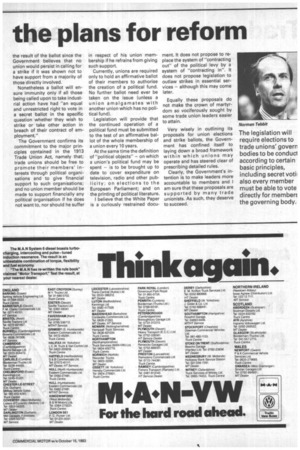the plans for reform
Page 37

If you've noticed an error in this article please click here to report it so we can fix it.
the result of the ballot since the Government believes that no union would persist in calling for a strike if it was shown not to have support from a majority of those directly involved.
Nonetheless a ballot will ensure immunity only if all those being called upon to take industrial action have had "an equal and unrestricted right to vote in a secret ballot in the specific question whether they wish to strike or take other action in breach of their contract of employment."
The Government confirms its commitment to the major principles contained in the 1913 Trade Union Act, namely that; trade unions should be free to promote their members' interests through political organisations and to give financial support to such organisations; and no union member should be made to support financially any political organisation if he does not want to, nor should he suffer in respect of his union membership if he refrains from giving such support.
Currently, unions are required only to hold an affirmative ballot of their members to authorise the creation of a political fund. No further ballot need ever be taken on the issue (unless a union amalgamates with another union which has no political fund).
Legislation will provide that the continued operation of a political fund must be submitted to the test of an affirmative ballot of the whole membership of a union every 10 years.
At the same time the definition of "political objects" on which a union's political fund may be spent is to be brought up to date to cover expenditure on television, radio and other publicity; on elections to the European Parliament; and on the printing of political literature.
I believe that the White Paper is a curiously restrained docu
ment. It does not propose to replace the system of "contracting out" of the political levy by a system of "contracting in". It does not propose legislation to outlaw strikes in essential services although this may come later.
Equally these proposals do not make the crown of martyrdom so vociferously sought by some trade union leaders easier to attain.
Very wisely in outlining its proposals for union elections and strike ballots, the Government has confined itself to laying down a broad framework within which unions may operate and has steered clear of prescribing detailed rules.
Clearly, the Government's intention is to make leaders more accountable to members and I am sure that these proposals are supported by many trade unionists. As such, they deserve to succeed.






















































































































